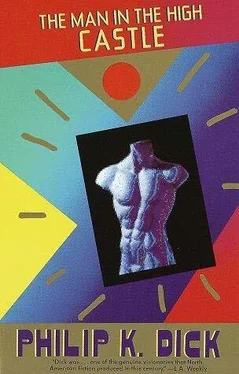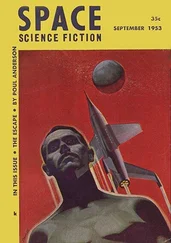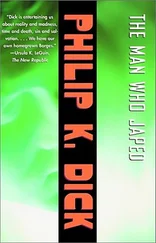“You say I’m a truck driver?” Joe broke in. “Listen; I rode that rig not to drive but keep off hijackers. Look like a truck driver, snoozing in the cab.” Flopping in a chair in the corner of the room he lay back, pretending sleep, his mouth open, body limp. “See?”
At first she did not see. And then she realized that in his hand was a knife, as thin as a kitchen potato skewer. Good grief, she thought. Where had it come from? Out of his sleeve; out of the air itself.
“That’s why the Volkswagen people hired me. Service record. We protected ourselves against Haselden, those commandos; he led them.” The black eyes glinted; he grinned sideways at Juliana. “Guess who got the Colonel, there at the end. When we caught them on the Nile—him and four of his Long Range Desert Group months after the Cairo campaign. They raided us for gasoline one night. I was on sentry duty. Haselden sneaked up, rubbed with black all over his face and body, even his hands; they had no wire that time, only grenades and submachine guns. All too noisy. He tried to break my larynx. I got him.” From the chair, Joe sprang up at her, laughing. “Let’s pack. You tell them at the gym you’re taking a few days off; phone them.”
His account simply did not convince her. Perhaps he had not been in North Africa at all, had not even fought in the war on the Axis side, had not even fought. What hijackers? she wondered. No truck that she knew of had come through Canon City from the East Coast with an armed professional ex-soldier as guard. Maybe he had not even lived in the U.S.A., had made everything up from the start; a line to snare her, to get her interested, to appear romantic.
Maybe he’s insane, she thought. Ironic… I may actually do what I’ve pretended many times to have done: use my judo in self-defense. To save my—virginity? My life, she thought. But more likely he is just some poor low-class wop laboring slob with delusions of glory; he wants to go on a grand spree, spend all his money, live it up—and then go back to his monotonous existence. And he needs a girl to do it.
“Okay,” she said. “I’ll call the gym.” As she went toward the hall she thought, He’ll buy me expensive clothes and then take me to some luxurious hotel. Every man yearns to have a really well-dressed woman before he dies, even if he has to buy her the clothes himself. This binge is probably Joe Cinnadella’s lifelong ambition. And he is shrewd; I’ll bet he’s right in his analysis of me—I have a neurotic fear of the masculine. Frank knew it, too. That’s why he and I broke up; that’s why I still feel this anxiety now, this mistrust.
When she returned from the pay phone, she found Joe once more engrossed in the Grasshopper , scowling as he read, unaware of everything else.
“Weren’t you going to let me read that?” she asked.
“Maybe while I drive,” Joe said, without looking up.
“ You’re going to drive? But it’s my car!”
He said nothing; he merely went on reading.
At the cash register, Robert Childan looked up to see a lean, tall, dark-haired man entering the store. The man wore a slightly less-than-fashionable suit and carried a large wicker hamper. Salesman. Yet he did not have the cheerful smile; instead, he had a grim, morose look on his leathery face. More like a plumber or an electrician, Robert Childan thought.
When he had finished with his customer, Childan called to the man, “Who do you represent?”
“Edfrank Jewelry,” the man mumbled back. He had set his hamper down on one of the counters.
“Never heard of them.” Childan sauntered over as the man unfastened the top of the hamper and with much wasted motion opened it.
“Handwrought. Each unique. Each an original. Brass, copper, silver. Even hot-forged black iron.”
Childan glanced into the hamper. Metal on black velvet, peculiar. “No thanks. Not in my line.”
“This represents American artistry. Contemporary.”
Shaking his head no, Childan walked back to the cash register.
For a time the man stood fooling with his velvet display boards and hamper. He was neither taking the boards out nor putting them back; he seemed to have no idea what he was doing. His arms folded, Childan watched, thinking about various problems of the day. At two he had an appointment to show some early period cups. Then at three—another batch of items returning from the Cal labs, home from their authenticity test. He had been having more and more pieces examined, in the last couple of weeks. Ever since the nasty incident with the Colt .44.
“These are not plated,” the man with the wicker hamper said, holding up a cuff bracelet. “Solid copper.”
Childan nodded without answering. The man would hang around for a while, shuffle his samples about, but finally he would move on.
The telephone rang. Childan answered it. Customer inquiring about an ancient rocking chair, very valuable, which Childan was having mended for him. It had not been finished, and Childan had to tell a convincing story. Staring through the store window at the midday traffic, he soothed and reassured. At last the customer, somewhat appeased, rang off.
No doubt about it, he thought as he hung up the phone. The Colt .44 affair had shaken him considerably. He no longer viewed his stock with the same reverence. Bit of knowledge like that goes a long way. Akin to primal childhood awakening; facts of life. Shows, he ruminated, the link with our early years: not merely U.S. history involved, but our own personal. As if, he thought, question might arise as to authenticity of our birth certificate. Or our impression of Dad.
Maybe I don’t actually recall F.D.R. as example. Synthetic image distilled from hearing assorted talk. Myth implanted subtly in tissue of brain. Like, he thought, myth of Hepplewhite. Myth of Chippendale. Or rather more on lines of Abraham Lincoln ate here. Used this old silver knife, fork, spoon. You can’t see it, but the fact remains.
At the other counter, still fumbling with his displays and wicker hamper, the salesman said, “We can make pieces to order. Custom made. If any of your customers have their own ideas.” His voice had a strangled quality; he cleared his throat, gazing at Childan and then down at a piece of jewelry which he held. He did not know how to leave, evidently. Childan smiled and said nothing.
Not my responsibility. His, to get himself back out of here. Place saved or no.
Tough, such discomfort. But he doesn’t have to be salesman. We all suffer in this life. Look at me. Taking it all day from Japs such as Mr. Tagomi. By merest inflection manage to rub my nose in it, make my life miserable.
And then an idea occurred to him. Fellow’s obviously not experienced. Look at him. Maybe I can get some stuff on consignment. Worth a try.
“Hey,” Childan said.
The man glanced up swiftly, fastened his gaze.
Advancing toward him, his arms still folded, Childan said, “Looks like a quiet half hour, here. No promises, but you can lay some of those things out. Clear back those racks of ties.” He pointed.
Nodding, the man began to clear himself a space on the top of the counter. He reopened his hamper, once more fumbled with the velvet trays.
He’ll lay everything out, Childan knew. Arrange it painstakingly for the next hour. Fuss and adjust until he’s got it all set up. Hoping. Praying. Watching me out of the corner of his eye every second. To see if I’m taking any interest. Any at all.
“When you have it out,” Childan said, “if I’m not too busy I’ll take a look.”
The man worked feverishly, as if he had been stung.
Several customers entered the store then, and Childan greeted them. He turned his attention to them and their wishes, and forgot the salesman laboring over his display. The salesman, recognizing the situation, became stealthy in his movements; he made himself inconspicuous. Childan sold a shaving mug, almost sold a hand-hooked rug, took a deposit on an afghan. Time passed. At last the customers left. Once more the store was empty except for himself and the salesman.
Читать дальше










